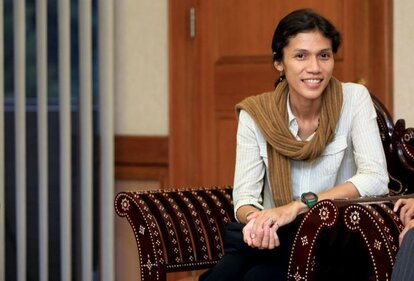Female Forward
Teacher Butet: Bringing Literacy to the Heart of Jungle

People living in the depths of the jungle think that a pencil is the devil with spiked eyes. Until Butet Manurung came along. Butet pioneered alternative education for indigenous people in remote areas of Indonesia, bringing literacy and creating equal opportunities.

Saur Marlina Manurung, more popularly known as Butet, shares that her early interest in teaching was due to her fondness for adventure. As a child, she was an avid reader, and adventure books found their way to her heart. Her dream was to become 'Indiana Jones,' always ready for a quest.
A dream is not merely a reverie if one acts on it. And so Butet chased her dream. She decided to take up two Bachelor's degrees: in Anthropology and in Indonesian Literature. She then continued with higher education and got a Master's degree in Anthropology. In the course of her study, she inched closer to indigenous people all over Indonesia. With diplomas in hand supplemented by determination and compassion, Butet pursued the work that she loved – dwelling in the forest as an educator for Orang Rimba, the people of the jungle in Bukit Dua Belas, Jambi, Sumatra.

Defeating the devil with spiked eyes
In her initial teaching days in the jungle, Butet recalls that every time she came with a pen, the people would run away. “Until I put my pen back in my bag, they would not come back." She later learned that Orang Rimba was cheated out of their land when they were made to sign a contract under false terms. Unable to read and write, Orang Rimba's human rights and rainforest were scraped off little by little.
Butet experienced a lot of rejection in her effort to bring literacy to the Orang Rimba. She even had to do it secretly with the risk of being expelled from the community. Yet she persisted.
Her resolve to teach the children of Orang Rimba on how to read and write eventually gained support when one of the students, who was the village chief of Orang Rimba, pointed out inaccuracies in a territorial written agreement. Then he demanded changes to be made to safeguard the interest of the village.
A win for customs, traditions, and the environment
The link between culture and environment is clear among indigenous peoples. They share a strong spiritual, cultural, social, and economic relationship with their ancestral lands. The right to land, territory, and natural resources are at the heart of indigenous peoples' struggles around the world.
Butet, with four fellow educators, developed literacy programs that are responsive to the strict customs, traditions, and lifestyles of indigenous peoples, and that address development challenges in marginalized communities. In 2003, they established a non-government organization called SOKOLA, which focuses on the integration of local values and perspectives in its teaching approach. As of today, SOKOLA has initiated programs in nine different provinces throughout Indonesia, bringing literacy to more than 10,000 individuals, both children and adults in isolated indigenous communities.
The pen is now their sword to ward off ignorance – a tool for empowerment.
Butet is the recipient of Asia’s Nobel Prize, the Ramon Magsaysay Award in 2014.